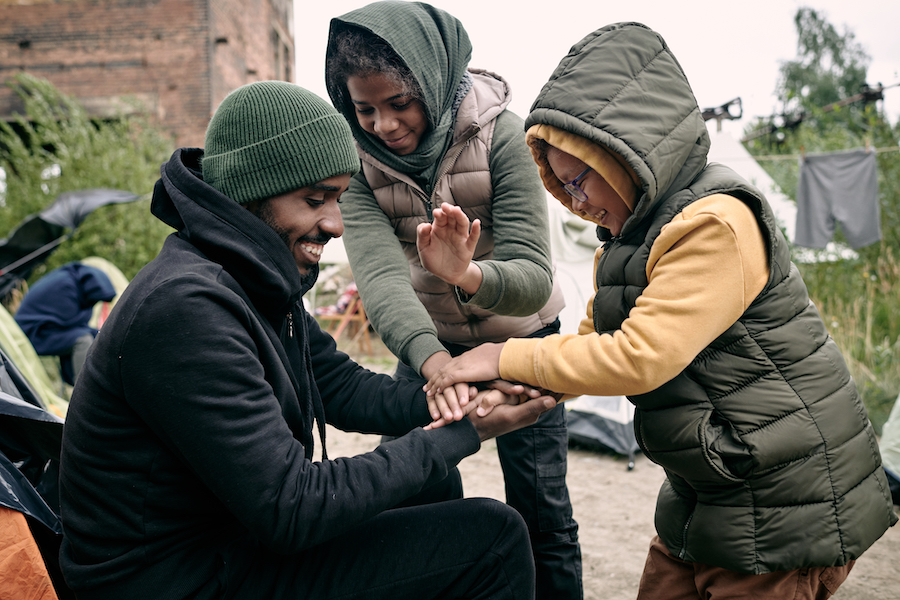Using mentorships to promote agency and a sense of belonging among asylum seekers
Amitay, G. (2022). From helpless rage to loving resistance: Resistance to othering and practices of agency in mentoring children of asylum seekers in Israel. Child & Youth Care Forum, 51(4), 705–727. https://doi.org/10.1007/s10566-021-09649-7
Summarized by Ariel Ervin
Notes of Interest:
- More than 30,000 African refugees and asylum seekers (AS) live in Israel.
- AS in Israel endure restrictive state policies, poor living conditions, and limited social services.
- Evidence shows that caring and close relationships can promote a sense of belonging, improve social achievements & self-motivation, lower school drop-out rates, increase trust in adults, and stymie anti-social behaviors among youth in distress.
- This study examines the experiences of non-professional volunteers who mentor children of asylum seekers in Israel and what approaches they use to support them.
- Four themes arose from the mentors’ first encounters with AS youth.
- Shock and revelation
- Resistance to othering
- Practices of agency
- Mutual agency & competence
- As mentors got to know their mentees, they became more aware of AS’ social position and applied that knowledge to adopting practices of resistance that promoted agency and a sense of belonging.
- Practices of resistance consist of the following:
- Centralize mentees’ narratives to retrieve their subjectivity
- Maintain dialogues to promote self-awareness and possibilities for change
- Practice reflexivity by interpreting each individual youth’s experiences, feelings, and histories as a way to understand them.
- Volunteers can contribute to establishing an agency-promoting environment to support AS youth.
Introduction (Reprinted from the Abstract)
Background
Children of African asylum seekers are a growing population in the Western world. Many of them who live in extreme social exclusion experience social alienation and powerlessness. Based on the assumption that the unique relationships between mentors and mentees can increase well-being, more in depth data on the perspectives of the practical work strategies of the volunteers themselves would be useful to understand their actions and underlying principles of actions in mentoring children of asylum seekers.
Objective
To explore the experiences and strategies employed by nonprofessional volunteers who mentor children of asylum seekers.
Method
In-depth semi-structured interviews with 19 volunteers who mentor children (age range 6–12) of African asylum seekers in Israel were conducted. A thematic analysis based on grounded theory approach was employed.
Results
Based on the volunteers’ perceptions, the data suggest a four-level process of strategies aimed at resistance to othering and the development of a sense of personal agency through mentoring.
Conclusions
The perceptions of volunteers who work with the children of asylum seekers suggest they use strategies that seek to increase the children’s sense of belonging and agency and to provide them with the unconditional support they usually do not receive elsewhere. The findings suggest that volunteers may help create an agency-promoting environment to help asylum seeker children cope with their distress. Studies using controlled designs might examine the effects of volunteers by developing guidelines and action principles as a basis for fostering standardized training for volunteers who work with children in extreme social exclusion.
Implications (Reprinted from the Discussion)
This study had three main goals. First, it sought to portray volunteer mentors’ strategies for mentoring AS children based on their reports of their experiences. Previous research had rarely dealt with these strategies, particularly regarding working with refugee children in extreme social exclusion. Second, the present study aimed to examine whether and how these volunteers applied practices that resisted the othering these children underwent by serving as a constant reliable presence for them, by legitimizing their self-narratives, and by giving them the space to be children without being preoccupied by daily worries. Third, it questioned whether and how the volunteers’ strategies reflected practices of agency, in other words, practices that saw the children as subjective individuals who had substantial knowledge concerning their social position, and acknowledged their entitlement to autonomy while suspending judgment and maintaining a reciprocal discourse. The following discussion analyzes these goals from the perspective of developing agency and a sense of belonging in contrast to otherness.
Mentoring Children in Extreme Social Exclusion
The literature on mentoring children in extreme social exclusion refers to coping strategies comparable to those found in this study (Lakind et al. 2014, 2015; Spencer et al. 2020; Wenzler-Cremer 2020). The mentors are exposed to the mentees’ life stresses and trajectories and try to develop strategies to cope with them. Since asylum seekers (AS) in Israel live in extreme poverty, suffer from racism, and are deprived of basic social and healthcare services, mentoring AS children includes all the “classic” characteristics of mentoring, but to an extreme degree; accordingly, the mentor’s challenges can be more extreme as well. Many examples of poverty and helplessness were mentioned in the interviews. Confronting this extreme reality transformed the mentors from “big brothers and sisters” having a good time with the child to agents of social change who possess a firm social consciousness.
To access this article, click here.









